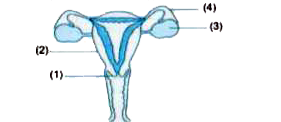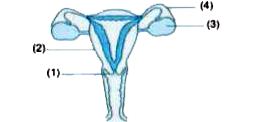A human female is born with a million of eggs (primary oocyte) at the time of birth but only some 500 eggs get a chance of maturiy. What is the destiny of rest of the eggs?
Rest of the eggs differrentiate back to thecal and granulosa cells.
Rest of the eggs nurture the dominant follicular cell.
Rest of the eggs move out of the ovary and are destroyed by leucocytes.
Rest of the eggs break down and are abosorbed i.e., degenerative follicular atresia.
The correct Answer is:D
The total numbe of follicles in two ovaries of a normal young adult woman is about four lakhs but only about 500 eggs reach maturity because many ovarian follicles (during primary oocyte stage) undergo degeneration. This degenerative process of follicles is called follicular atresia and such follicles are known as atretic follicles.
Topper's Solved these Questions
Similar Questions
When a female child is born, her ovaries already contain thousands of immature eggs (or ova) contained in immature structures A. On maturing, A bursts open and and egg shoots cut of the ovary in a process called B. The process B starts in the female after a time period x. Before every occurrence of process B, the inner lining of uterus becomes thick and soft with lots of blood vessels in it. When the egg cell gets fertilized by a sperm, then an event C occurs in the life of mature human female which lasts for time period y leading to the birth of baby. If however, the egg cell released by the ovary does not get a sperm to fuse with, then the thick and soft inner lining of uterus breaks down and comes out of the female's body in an event called D. The occurrence of event D is controlled by chemical substances E.
(a) What are A?
(b) What is process B ?
(c) What is the time period x?
(d) Name the event C.
(e) How much is the period y ?
(f) What is the name of process D?
(g) Name the chemical substances E.
View SolutionAnswer question on the basis of your understanding of the following paragraph and the related studied concepts :
(i) When a girl is born, the ovaries already contain thousands of immature eggs
(ii) On reaching puberty, some of these start maturing. One egg is produced every month by one of the ovaries.
(iii) The egg is carried from the ovary to the womb through a thin oviduct or fallopian tube.
(iv) The two oviducts unite into an elastic bag-like structure known as the uterus.
(v) The uterus opens into the vagina through the cervix.

What is the site of fertilisation ?
View Solution
Knowledge Check
In human female, the fertilized eggs gets implanted in uterus
AAfter two months of fertilizationBAfter one month of fertilizationCAfter 3 weeks of fertilizationDAfter about 7 days of fertilizationIn human female the fertilised eggs gets implantation in uterus
Aafter two months of fertilisationBafter one month of fertilisationCafter 3 weeks of fertilisationDafter about 7 days of fertilisationIn the following question the 1st and the last part of the sentence/passage are numbered 1 and 6. The rest of the sentence/ passage is split into four parts and named P, Q, R and S. These four parts are not given in their proper order. Read the sentence/passage and find out which of the four combinations is correct.
1. Some animals like fishes lay eggs and leave them.
P. The mother does not care for the eggs at all.
Q. They lay thousands of eggs at a time but do not look after them.
R. Most of the eggs die and only a few of them develop into fishes.
S. She simply leaves the eggs and never comes back to them.
6. Is this not something terrible? Yet, it is a fact.AQPSRBPSQRCRQPSDQSPR
Answer question on the basis of your understanding of the following paragraph and the related studied concepts :
(i) When a girl is born, the ovaries already contain thousands of immature eggs
(ii) On reaching puberty, some of these start maturing. One egg is produced every month by one of the ovaries.
(iii) The egg is carried from the ovary to the womb through a thin oviduct or fallopian tube.
(iv) The two oviducts unite into an elastic bag-like structure known as the uterus.
(v) The uterus opens into the vagina through the cervix.

Give suitable terms for starting and ending of reproductive phase in human females.
View SolutionName the human male reproductive organ that produces sperms and also secretes a hormone.
Write the functions of the secreted hormone.
(b) Name the parts of the human female reproductive system where
(i) fertilisation takes place,
(ii) implantation of the fertilised egg occurs.
Explain how the embryo gets nourishment inside the mother's body.
View SolutionName the human male reproductive organ that produces sperms and also secretes a hormone.
Write the functions of the secreted hormone.
(b) Name the parts of the human female reproductive system where
(i) fertilisation takes place,
(ii) implantation of the fertilised egg occurs.
Explain how the embryo gets nourishment inside the mother's body.
View SolutionIn the following question the 1st and the last part of the sentence/passage are numbered 1 and 6. The rest of the sentence/passage is split into four parts and named P, Q, Rand S. These four parts are not given in their proper order. Read the sentence/passage and find out which of the four combinations is correct.
1. . Some animals like fishes lay eggs and leave them.
P. The mother does not care for the eggs at all.
Q. They lay thousands of eggs at a time but do not look after them.
R. Most of the eggs die and only a few of them develop into fishes.
S. She simply leaves the eggs and never comes back to them.
6. Is this not something terrible? Yet, it is a fact.
View SolutionRead the passage and answer the questions.
An important reason for ants’ success is their ability to talk — not with words but with tastes and smells. Their vocabulary is made up of a mixture of substances they produce in various parts of their bodies and emit via their glands. The so-called pheromones are signals that other ants can smell and taste. The messages they communicate set off a specific kind of behaviour in the messengers - fetching food, for instance, or looking after the brood, or feeding the queen. Furthermore, ant talk is not limited to food. Ants use a hundred different scents to communicate a hundred different messages. With such a sophisticated array of messenger fragrances, ants organize complicated tasks with close to perfect efficiency. Every ant is a specialist with a vocation of its own. The queen has one of the biggest workloads - laying eggs round the clock. Despite the presence of a queen, an ant colony is not a monarchy. The word ‘queen’ is actually is a misnomer. She does not reign over others, she is a machine for laying eggs. From morning till night she produces her daughters, the sterile workers of her colony. Males do not have to do much and the queen only produces them when reproduction time is approaching. Their main job is to fertilize the winged females after which they die.
Messengers do not have much free time either. When you see a handful of ants scurrying around in the kitchen without any apparent purpose, it does not mean they have lost their bearings. They are scouts foraging for food. Once they have found something edible, they report back to the base, depositing their chemical spores on the way. “Food located, please collect,” is the taste and smell message for the other members back at the nest.
Which of these is NOT a function of the messengers?
View Solution